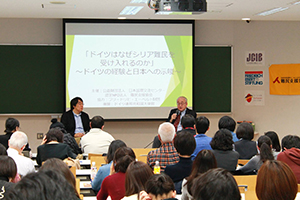International Symposium "Germany's experience with Refugees and the Implications for Japan"
Called the worst refugee crisis since World War II, the Syrian humanitarian disaster has displaced half of the country’s total population of 22 million, and about a third of them, 4.2 million people, have fled to neighboring countries. Hundreds of thousands have been traveling to Europe seeking refuge and many are heading toward Germany. At the beginning of the year, 240,000 Syrian refugees arrived in Germany, and a total of 800,000 refugees from several countries are expected to arrive during the course of the year.
Given the apparent challenges and risks, why has Germany continued to welcome refugees? And what lessons can Japan learn from the German experience?
Program
Opening Remarks: Toshihiro Menju
Keynote Speech 1: “The rapid increase in refugees and Germany’s response”—Andrew Horvat (Josai International University)
Keynote Speech 2: “Refugees and German domestic affairs”—Ryo Kuboyama (Senshu University)
Panel Discussion
Speakers
Andrew Horvat Josai International University
Ryo Kuboyama Senshu University
Yuki Moriya Public Information Officer, UN Refugee Agency
Eri Ishikawa Board Chair, Japan Association for Refugees
Moderator: Toshihiro Menju, Managing Director and Chief Program Officer, Japan Center for International Exchange



